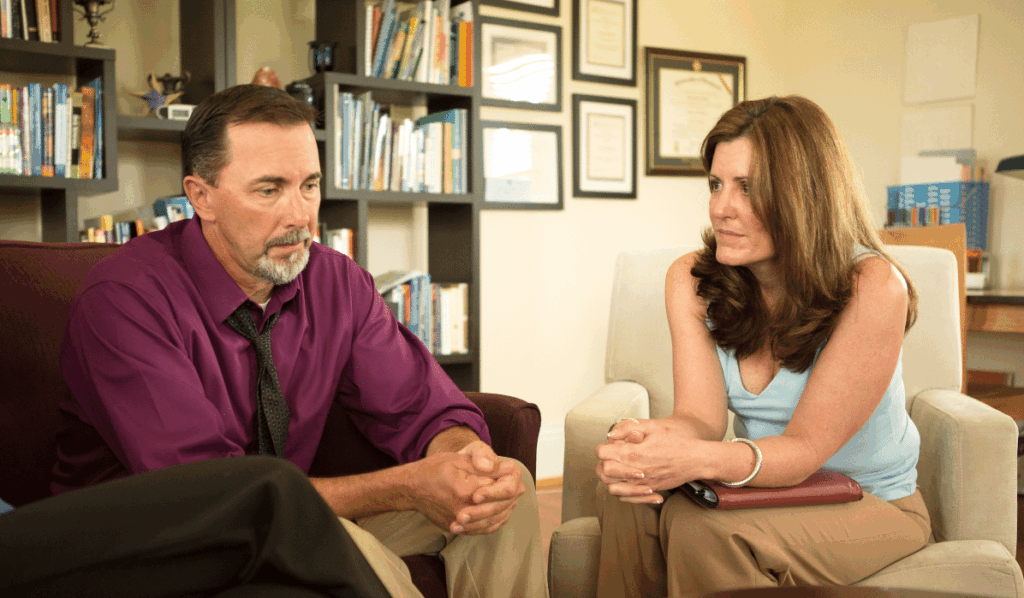
Beyond “I’m Fine”: How to Start Difficult Conversations
Beyond “I’m Fine”: How to Start a Difficult Conversation with Your Partner
Breaking the Silence: Steps to Meaningful Communication

Recognizing When You’re Not Really “Fine”
Those Familiar Moments
We’ve all had those moments. Maybe you’re unloading the groceries, driving together in silence, or just lying side-by-side before bed—knowing there’s something bothering you, but you just can’t get the words out. Your partner notices your mood and asks, “Is something wrong?” Almost on autopilot, you brush it off: “I’m fine.”
The Truth Beneath the Words
But deep down, you know that’s not true. Maybe your mind is racing, you keep replaying what happened earlier, or you’re holding back tears just to keep the peace. You want to talk, but it feels scary—and honestly, you’re not even sure where to start.
The Cost of Saying “I’m Fine”
Why We Hide Our True Feelings
It’s easy to say “I’m fine” when really, you’re anything but. Maybe you’re afraid that saying what’s really on your mind will start an argument, upset your partner, or just make everything more complicated. So, you hold it in, thinking it’ll just go away on its own. But the truth is, those unspoken worries and hurts don’t disappear—they quietly grow, turning little annoyances into bigger problems over time.
When Small Things Become Big Issues
Sometimes it’s something as small as feeling ignored when your partner is on their phone at dinner, or as big as not feeling appreciated for everything you do. The longer we go without talking about these things, the more distance can sneak in between us.
Why Tough Conversations Matter
More Than Just “Winning” or “Losing”
Talking about tough topics with your partner isn’t easy—most of us would rather avoid an argument or uncomfortable moment. But these conversations are important for keeping your relationship real and healthy.
Reflecting on Your Own Experience
Think about how many times you’ve stayed silent to keep the peace, even though something was bothering you. The thing is, it’s not just about “winning” or proving your point. It’s about closing the distance between you and your partner, finding a way to really hear each other, and working through stuff together. Not sure how to get started? You’re definitely not alone. Let’s break down some practical steps to move past “I’m fine” and actually talk about what’s going on.
Why We Avoid Difficult Conversations
The Real Reasons We Avoid Difficult Conversations
Before we get into how to have these talks, let’s be honest about why we bite our tongues. For a lot of us, staying quiet just seems easier. Maybe you worry that bringing something up will start an argument, or you tell yourself, “Now’s not the right time; maybe later.” Sometimes, it just feels safer not to say anything at all. You might be afraid of hurting your partner’s feelings or making things awkward for the rest of the evening.
Common Fears and Hesitations
Thoughts like, “If I talk about this, it’s just going to turn into the same old fight,” or, “I don’t want to ruin a good mood,” are really common.
Why These Feelings Are Normal—and Why Speaking Up Matters
Hidden Worries, Real Impact
These worries are totally normal—most of us have felt them at some point. But holding things in usually does more harm than good. When we keep quiet, tension builds up, and what started as a small annoyance can turn into a bigger issue down the road. Sometimes, trying to avoid conflict means we end up feeling disconnected or even resentful.
The Power of Talking Honestly
Real strength in a relationship doesn’t come from pretending everything’s okay; it comes from being able to talk things through and know you’ll both be heard. Even if it’s uncomfortable, speaking up gives you both a chance to understand each other and find a way forward—together.
Step 1: Preparation is Key
Why Planning Matters
It’s great to be spontaneous for fun plans, but when it comes to tough conversations, a little planning goes a long way. Think about it—trying to talk about something serious right as your partner walks in exhausted from work, or when you’re both half-asleep before bed, usually doesn’t end well. These moments catch you both off guard and can easily lead to misunderstandings or defensiveness.
Choosing the Right Moment
Instead, try to pick a time when you both have some energy and aren’t distracted, so you can really listen to each other and have a chance at a productive, caring conversation.
Pick the Right Time for Real Talk
Pick a time when you’re both relaxed and not juggling a million things—maybe after dinner or during a quiet moment on the weekend. Try to avoid bringing up big topics when you’re hungry, stressed from work, or already feeling cranky. There’s nothing wrong with planning ahead for these talks, either.
Giving a Heads-Up
You might say, “There’s something important I’d like to chat about—would Saturday morning over coffee be a good time for us?” This way, you both know what to expect and can come into the conversation feeling ready and open.
Giving Your Partner Time to Prepare
Letting your partner know ahead of time gives them a chance to mentally prepare, so it doesn’t feel like trouble is coming out of nowhere. It’s kind of like setting a date to talk—this way, nobody feels ambushed and you’ll both have the headspace to really listen and take each other seriously.
Checking In with Your Intentions
Take a moment to check in with yourself: What am I really hoping for with this conversation? Are you wanting to just vent and get something off your chest? Are you trying to prove your point or “win” the discussion? Or is your true goal to strengthen your relationship and feel closer to your partner?
Getting Clear About Your Intentions
For example, maybe you want to talk because you’ve been feeling a little left out when your partner spends extra time at work, or you’re hoping for more help around the house but aren’t sure how to bring it up without sounding critical. Getting clear about your intentions—like wanting to feel understood or work as a team—can help you approach the talk with kindness instead of frustration. If you go in wanting to connect, it’ll show in the way you talk and listen. If you treat it like a battle, chances are your partner will get defensive. So, try to think of the issue as something you can tackle together, not a fight you have to “win.”
Showing Up as a Team, Not Opponents
If you’re hoping to really connect and work things out, you’ll probably find yourself speaking in a warmer, gentler way. But if you go in just wanting to “win,” your partner is likely to put their guard up fast. Try to come into the talk with curiosity—like you’re solving a puzzle together—instead of thinking of your partner as the problem.
Fixing Problems Together
Picture it like fixing a leaky faucet as a team, not pointing fingers about who broke it. This way, you both stay on the same side and can figure things out without turning it into a battle.
Step 2: The Art of the Soft Start-Up
Why How You Start the Conversation Matters
How you kick off a conversation can really set the tone for how it goes. Think about it: if you jump in right away with something like, “You never listen to me,” chances are things will get tense fast. Instead, starting gently—even if you’re frustrated—can make a huge difference.
What Is a “Soft Start-Up”?
Relationship experts call this a “soft start-up.” This just means trying to lead with kindness, even when you’re upset. Instead of laying out all your complaints right off the bat, try sharing what’s on your mind in a way that invites your partner in, rather than putting them on the defensive.
Inviting Your Partner In
For example, saying, “I’ve been feeling a little unheard lately and I’d love to talk about it,” opens the door to a more honest and less stressful conversation.
Use “I” Statements Instead of “You” Statements
Why “I” Statements Matter
Ever notice how saying “you never help around here” instantly puts your partner on the defensive? It’s like waving a red flag. That’s because “you” statements—like “You always forget” or “You don’t care”—sound like blame, and nobody wants to feel attacked.
Shifting the Conversation
Instead, try flipping it with “I” statements. When you say how you’re feeling and what’s actually bugging you, it takes the heat off your partner and opens the door for a real conversation.
- Instead of: “You’re so messy and never help out.”
- Try: “I feel overwhelmed when I see dishes in the sink after I’ve cooked dinner. It would really help me feel supported if we could share the cleanup.”
Framing Your Feelings with “I” Statements
Think about sharing how you feel like this:
- I feel… (an emotion)
- When… (a specific event or situation, not a character flaw)
- I need… (a positive request)
Step 3: Managing Emotions During the Talk
Expect Big Feelings—And Know You’re Not Alone
Even if you plan ahead, talking about tough stuff can still bring up big emotions. Maybe you notice your heart pounding or your hands shaking, or you feel like you might tear up or snap back without meaning to. This is totally normal—most of us feel nervous or worried when it comes to bringing up sensitive things, especially if those talks haven’t always gone well in the past.
It’s Okay to Feel Nervous
If you’ve ever found your mind racing, felt your voice get tense, or realized you’re holding your breath, you’re definitely not alone. Starting a real conversation with your partner can be hard, but those feelings just mean you care about getting it right.
The Power of the Pause
If you notice the conversation starting to heat up—maybe voices get louder, someone gets sarcastic, or one of you just goes quiet—it’s a clear signal to hit pause. None of us do our best talking when we’re upset or feeling attacked; it’s like trying to solve a puzzle while the fire alarm is blaring. Stress puts us in “fight or flight” mode, so it’s totally normal to need a break before things spiral or words get said that you’ll both regret.
Agreeing on a Pause: How to Take a Break Productively
Before you even start the conversation, agree on a simple way to signal when you need a break—like saying, “I’m feeling overwhelmed right now—can we pause for 20 minutes and come back?” This doesn’t mean you’re avoiding the issue; it just means you both need time to cool off so you don’t say things you’ll regret.
Making the Most of Your Break
Use this break to take a walk, grab some water, or do something calming—maybe even just step outside and get some fresh air. Just try not to use the time to build your next argument in your head. The goal is to come back with a clearer mind and a bit more patience, so you can keep the conversation helpful instead of heated.
Validate Before You Vindicate
Why Validation Matters
Everyone wants to feel like their partner gets where they’re coming from. Before you jump in to defend your side or explain what you meant, take a moment to show your partner you’re really listening. You don’t have to see things the same way or agree on every detail to acknowledge how they feel.
How to Show You’re Listening
For example, maybe your partner is upset because you forgot to check in during a long day—if you can say, “I can see how that made you feel left out,” it tells them their feelings matter to you, even if you didn’t mean to hurt them. Little moments of validation like this help take down walls so you can both get back on the same team.
Ways to Show Your Partner You’re Listening
Validation in Action
Saying something like, “I get why that would bother you,” or, “It makes sense you felt hurt when I said that,” can really help diffuse tension. It’s kind of like letting your partner know you’re listening—not just to their words, but to how they’re feeling. When you do this, you both feel like you’re on the same side, not just arguing from opposite corners.
Small Gestures That Matter
Even something simple, like a nod or saying, “I hear you,” can go a long way in showing that you care about what they’re experiencing.
Step 4: Moving Toward a Solution
Shifting from Problems to Solutions
Once you’ve both had a chance to say what’s really on your mind and feel like the other person actually gets it, you can start to figure out what to do next. This is when you shift from replaying what went wrong—like, “You never text me when you’re running late” or “I felt hurt when plans changed at the last minute”—and start looking at, “Okay, how can we make this better together?”
Small Changes Make a Big Difference
Maybe it’s setting a reminder for check-ins or agreeing to talk things through before last-minute changes. The point isn’t to have all the answers right away—instead, it’s about making small, real changes and showing each other you’re willing to try. Little steps forward every time you talk can really add up and help keep your relationship growing in a positive direction.
Use Open-Ended Questions to Foster Dialogue
Conversation Starters That Build Understanding
Try asking open-ended questions to get the conversation going, like:
- “What do you think we can do differently next time?”
- “How can I support you in this?”
- “What does a compromise look like for us here?”
Progress, Not Perfection
Celebrate the Small Wins
Remember, things probably won’t get fixed overnight—and that’s okay. Relationships are a work in progress, just like learning a new skill or working on a home project together. Sometimes you try a solution and it doesn’t quite land; that doesn’t mean you’ve failed, it just means you’re learning what works for you both.
Noticing Growth Together
Celebrate those small wins—like talking without yelling, agreeing to try something new, or just feeling a bit more understood. Every little step toward understanding each other is progress worth noticing.
When to Consider Reaching Out for Extra Support
When Conversations Stall or Feel Overwhelming
Sometimes, even when we try our hardest, we hit a wall. Maybe you find yourselves having the same argument over and over, or you both end up shutting down instead of working things out. Or maybe just the idea of bringing up tough topics feels so overwhelming that you keep putting it off, hoping things will fix themselves.
Normalizing the Need for Help
If any of this sounds familiar, know that you’re not alone—it’s something a lot of couples go through. When you can’t get unstuck or you’re feeling lost about what to do next, it might be time to get some extra help from someone outside your usual circle, like a counselor or therapist.
How Couples Counseling Can Help
Navigating Together with Support
Couples counseling is like having a guide when you’re stuck in a tough spot, trying to read a map you’ve never seen before. It gives you a safe place to figure things out together, with someone who’s trained to notice patterns you might not even realize are getting in the way—like interrupting each other, shutting down, or circling back to the same fight.
Practical Tools for Connection
A therapist will give you down-to-earth tools for talking and listening, showing you real ways to reconnect, even when things feel messy or tense. Reaching out for help doesn’t mean you’ve failed; it’s simply choosing support instead of staying stuck.
Taking the Next Step
It’s a bold step for anyone who wants to feel closer, stronger, and truly heard in their relationship.
Moving Beyond “I’m Fine”: Building True Connection
Why Opening Up is Worth It
Getting past just saying “I’m fine” really does take guts. You have to be willing to open up, get a little uncomfortable, and trust that it’s worth it—even if it feels awkward or scary at first.
The Benefits on the Other Side of Difficult Conversations
But here’s the thing: on the other side of those tough conversations, there’s a real chance for you and your partner to feel closer, to laugh together again, or to finally let go of something that’s been weighing you down. Imagine being able to talk honestly about what’s on your mind, and knowing your partner gets it. That kind of trust and connection is what makes all the hard moments worthwhile.
Ready to Strengthen Your Communication?
If you’re finding it tough to start these important conversations, or you feel stuck repeating the same patterns, you don’t have to navigate it alone. Our counseling team is here to support you and your partner in building healthier, more open dialogue—whether in-person or virtually. Reach out today to take the next step toward more honest, fulfilling conversations together.
Frequently Asked Questions (FAQs)
Q1: What if my partner refuses to talk when I bring up an issue?
A: It can be frustrating when a partner shuts down (stonewalling). Instead of pushing harder, which often increases withdrawal, try to express your need for connection gently. You might say, “I miss feeling close to you, and I feel like this issue is in the way. I don’t want to fight; I just want to understand each other. Can we try talking about this for just 10 minutes later?” If the refusal persists, this may be a dynamic that requires professional support to dismantle.
Q2: How do I stop myself from crying during a serious conversation?
A: Crying is a natural physiological response to stress or strong emotion; it doesn’t mean you are weak or “losing” the argument. If you start to cry, acknowledge it without shame. Say, “I’m crying because this is important to me, but I can still listen.” If you need a moment to collect yourself so you can speak clearly, ask for a short break. Your emotions are valid.
Q3: Is it okay to write a letter instead of talking face-to-face?
A: Writing can be a wonderful tool, especially if you struggle to articulate your thoughts in the moment or fear being interrupted. A letter allows you to organize your feelings and use careful language. However, a letter should be an invitation to a conversation, not a replacement for one. Ask your partner to read it and then set a time to discuss it in person or virtually.
Q4: How do we handle conversations about topics we fundamentally disagree on?
A: Not every disagreement is solvable. Dr. John Gottman’s research suggests that 69% of relationship conflicts are “perpetual problems” based on personality differences or lifestyle needs. The goal with these isn’t always resolution, but management. Can you understand your partner’s underlying dream or fear? Can you reach a compromise where both of you can live with the outcome, even if it isn’t perfect? Respectful disagreement is healthy; contempt is not.
Q5: What if I use “I” statements but my partner still gets defensive?
A: Changing communication patterns takes time. If your partner gets defensive, try not to get defensive back. Gently clarify your intent: “I’m not trying to blame you. I’m just trying to share how I’m feeling so we can be closer.” It takes practice for both partners to trust that a complaint isn’t an attack. Be patient with the process.
Take the Next Step Toward Healthier Communication
Feeling inspired to improve the way you and your partner talk about tough topics? Our caring counselors are ready to guide you through proven communication strategies, whether in-person or through secure virtual sessions. Let us help you and your loved one rediscover connection and create lasting change—reach out to Maplewood Counseling to schedule your session today.
Helpful Resources
- Individual Therapy: Personalized support for managing depression and stress.
- Understanding Anxiety: Learn how therapy can help manage anxiety.
- Grief Counseling: Support for processing loss and navigating grief.
- Guide to Self-Esteem: Build confidence and self-worth.
- Trauma-Informed Therapy: Support for Couples healing from past trauma.








